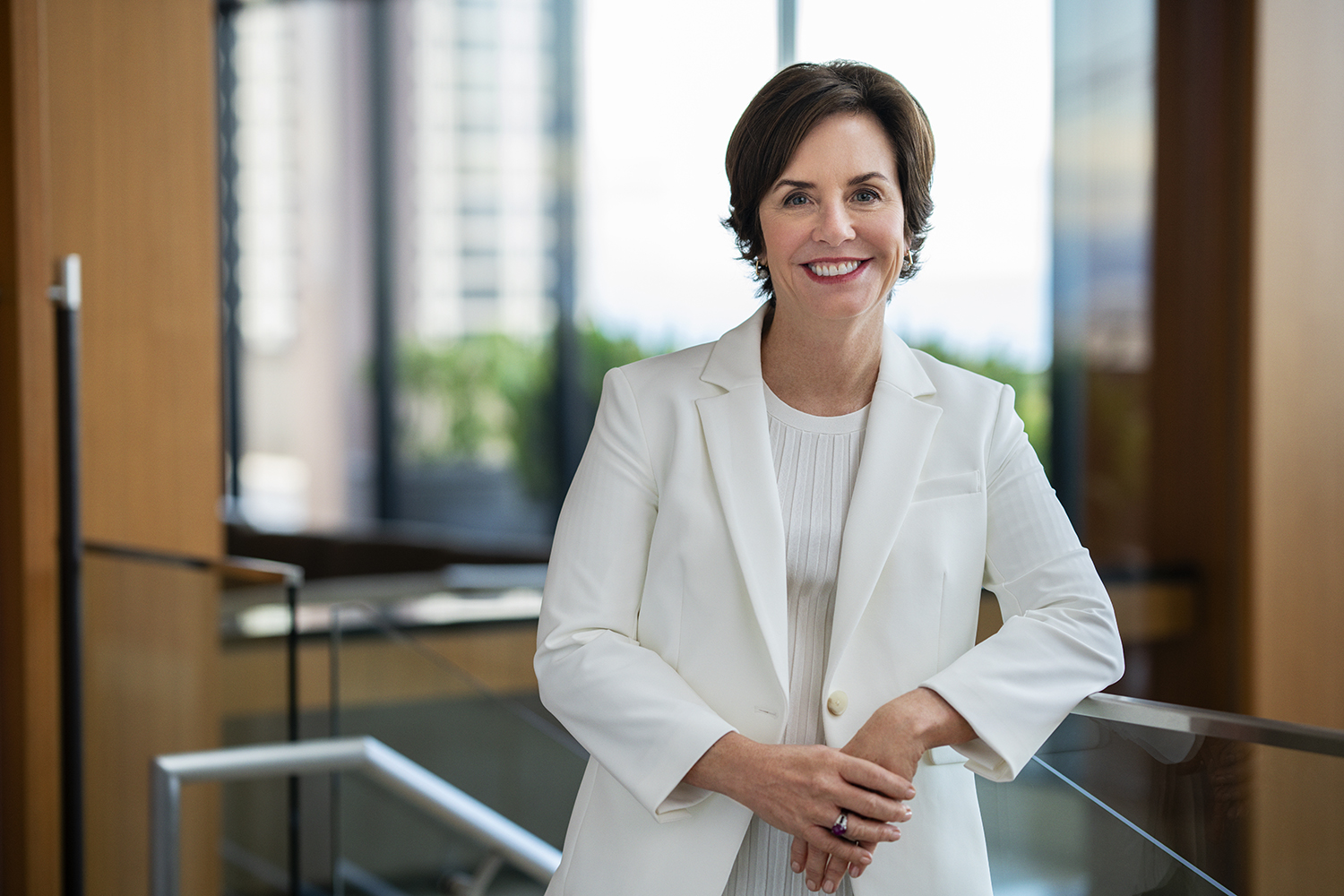Getting In the Investing Game
Carrie Schwab-Pomerantz has some simple investing advice for women: Find a buddy and attend a few seminars to learn the language.


Profit and prosper with the best of Kiplinger's advice on investing, taxes, retirement, personal finance and much more. Delivered daily. Enter your email in the box and click Sign Me Up.
You are now subscribed
Your newsletter sign-up was successful
Want to add more newsletters?

Delivered daily
Kiplinger Today
Profit and prosper with the best of Kiplinger's advice on investing, taxes, retirement, personal finance and much more delivered daily. Smart money moves start here.

Sent five days a week
Kiplinger A Step Ahead
Get practical help to make better financial decisions in your everyday life, from spending to savings on top deals.

Delivered daily
Kiplinger Closing Bell
Get today's biggest financial and investing headlines delivered to your inbox every day the U.S. stock market is open.

Sent twice a week
Kiplinger Adviser Intel
Financial pros across the country share best practices and fresh tactics to preserve and grow your wealth.

Delivered weekly
Kiplinger Tax Tips
Trim your federal and state tax bills with practical tax-planning and tax-cutting strategies.

Sent twice a week
Kiplinger Retirement Tips
Your twice-a-week guide to planning and enjoying a financially secure and richly rewarding retirement

Sent bimonthly.
Kiplinger Adviser Angle
Insights for advisers, wealth managers and other financial professionals.

Sent twice a week
Kiplinger Investing Weekly
Your twice-a-week roundup of promising stocks, funds, companies and industries you should consider, ones you should avoid, and why.

Sent weekly for six weeks
Kiplinger Invest for Retirement
Your step-by-step six-part series on how to invest for retirement, from devising a successful strategy to exactly which investments to choose.
Carrie Schwab-Pomerantz, the daughter of Charles Schwab, is board chair and president of the Charles Schwab Foundation, whose mission is to help people become financially fit through education; senior vice president of Charles Schwab & Co.; and board chair of Schwab Charitable, a donor-advised fund. She has an MBA and is a certified financial planner. During a visit to the Kiplinger offices, she and I had a wide-ranging conversation about women’s attitudes toward money, what she learned from her father about finances, and how she brought up her own three children.
What has your experience taught you about how women approach financial issues? Women are more likely than men to lack confidence in financial matters and to be less engaged in making financial decisions. This has changed some over the years with the rise of 401(k) plans and women in the workforce, and that’s a positive trend. But I’m not sure we’re as engaged as we should be versus our male counterparts. In Schwab’s Modern Wealth Index [which tracks how well Americans are planning and managing their wealth], 67% of women said wealth meant having good physical health rather than having a lot of money. But money is critical to our physical security.
How do you address this situation? It’s important to focus on financial programs for women to help them gain more confidence. We host women-focused educational events, generally small workshops designed to feel informal so that people feel comfortable speaking up and asking questions.
From just $107.88 $24.99 for Kiplinger Personal Finance
Become a smarter, better informed investor. Subscribe from just $107.88 $24.99, plus get up to 4 Special Issues

Sign up for Kiplinger’s Free Newsletters
Profit and prosper with the best of expert advice on investing, taxes, retirement, personal finance and more - straight to your e-mail.
Profit and prosper with the best of expert advice - straight to your e-mail.
You say this kind of education should start at an early age. One of our surveys showed that when families have conversations about money with their children, they talk differently to their sons and daughters. To their daughters, they emphasize saving and budgeting. With their sons, they are more likely to discuss investing and estate planning. My female colleagues in the financial industry all had family members who talked to them about investing, so it’s important to treat daughters and sons the same.
What was the best advice your father gave you about money? He is a man of few words and taught more by example. He encouraged me to have a strong work ethic—at 16, I was working as a file clerk for his company—and to have a higher purpose and impact. Helping people manage their money gives them confidence, security and social mobility. He also taught me to save, which I’ve been doing since I was 9 years old.
How about investment advice? When I was 23 and opening my own retirement account, I called my dad and asked him where I should invest. He told me just to pick two funds and I’d be fine. The important thing was to participate in the markets.
How did you teach your own children about money? When they were younger, they got allowances and had to make their own money decisions. They were all required to have summer jobs in high school. And when they opened their first Roth IRAs, they had to fill out their own paperwork to invest. I wanted them to feel comfortable going into a bank or a Schwab office. That’s particularly important for women because a financial institution can seem like a cold place.
What advice would you give women? Find a buddy and attend a few seminars to learn the language of finance. Or use a financial adviser as a sounding board. If you start investing in your twenties and save 10% for the rest of your life, you’ll be okay. If you’ re married, know where your money is and be involved with major financial decisions. It’s fine to delegate, but don’t abdicate.
Profit and prosper with the best of Kiplinger's advice on investing, taxes, retirement, personal finance and much more. Delivered daily. Enter your email in the box and click Sign Me Up.

Janet Bodnar is editor-at-large of Kiplinger's Personal Finance, a position she assumed after retiring as editor of the magazine after eight years at the helm. She is a nationally recognized expert on the subjects of women and money, children's and family finances, and financial literacy. She is the author of two books, Money Smart Women and Raising Money Smart Kids. As editor-at-large, she writes two popular columns for Kiplinger, "Money Smart Women" and "Living in Retirement." Bodnar is a graduate of St. Bonaventure University and is a member of its Board of Trustees. She received her master's degree from Columbia University, where she was also a Knight-Bagehot Fellow in Business and Economics Journalism.
-
 Nasdaq Leads a Rocky Risk-On Rally: Stock Market Today
Nasdaq Leads a Rocky Risk-On Rally: Stock Market TodayAnother worrying bout of late-session weakness couldn't take down the main equity indexes on Wednesday.
-
 Quiz: Do You Know How to Avoid the "Medigap Trap?"
Quiz: Do You Know How to Avoid the "Medigap Trap?"Quiz Test your basic knowledge of the "Medigap Trap" in our quick quiz.
-
 5 Top Tax-Efficient Mutual Funds for Smarter Investing
5 Top Tax-Efficient Mutual Funds for Smarter InvestingMutual funds are many things, but "tax-friendly" usually isn't one of them. These are the exceptions.
-
 Readers Share Tips for Raising Money Smart Kids
Readers Share Tips for Raising Money Smart KidsRaising Money-Smart Kids What's the right age for a child to have their own credit card? Opinions vary.
-
 A Talk With Carrie Schwab-Pomerantz
A Talk With Carrie Schwab-PomerantzWomen & Money Investing is the key to building a nest egg that will last a long lifetime, says Schwab-Pomerantz.
-
 Financial Planning and Investing: Women Closing the Confidence Gap
Financial Planning and Investing: Women Closing the Confidence GapWomen & Money Since the start of the pandemic, women have become more involved in their financial futures.
-
 A Salute to Money Smart Moms
A Salute to Money Smart Momssavings Today's mothers are in a perfect position to share their experiences in the workforce and as investors.
-
 Advice From Confident Investors
Advice From Confident Investorsinvesting Take advantage of publications, podcasts, adult ed classes and other resources, including family members.
-
 What Women Want in a Financial Adviser
What Women Want in a Financial AdviserFinancial Planning They’re put off by aggressive sales tactics and excessive jargon.
-
 How to Be a Confident Investor
How to Be a Confident InvestorInvestor Psychology You don’t have to be an expert. Start with your employer’s retirement savings plan.
-
 My Best Investment Advice
My Best Investment Adviceinvesting These are the three steps to investing success: start soon, start small and keep it simple.